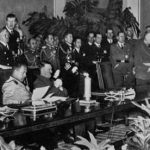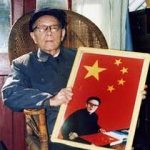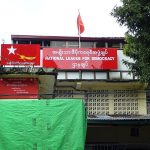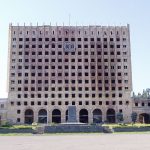 1940 – The Tripartite Act is signed in Berlin. The act was signed by German Foreign Minister Joachim von Ribbentrop, his Italian counterpart Galeazzo Ciano, and Japanese Ambassador to Germany Saburo Kurusu. Through this agreement, the Rome-Berlin-Tokyo axis would also begin the de jure plan, for the conquest and division of the world according to their zones of influence. But this alliance would not be fruitful as Italy would capitulate only 3 years later. While Germany and Japan would be destroyed by the onslaught of allied forces.
1940 – The Tripartite Act is signed in Berlin. The act was signed by German Foreign Minister Joachim von Ribbentrop, his Italian counterpart Galeazzo Ciano, and Japanese Ambassador to Germany Saburo Kurusu. Through this agreement, the Rome-Berlin-Tokyo axis would also begin the de jure plan, for the conquest and division of the world according to their zones of influence. But this alliance would not be fruitful as Italy would capitulate only 3 years later. While Germany and Japan would be destroyed by the onslaught of allied forces.
 1944 – Kassel, Germany, becomes known as the largest air battle in the country. Nearly 500 U.S. military aircraft, including half heavy bombers, would undertake the mission to destroy the Henschel and Sohn plant. This company produced heavy armaments for German tanks on both fronts. The Americans lost 32 aircraft and 118 pilots. 120 others were killed while parachuting or taken prisoner. While the Germans lost 29 planes and 18 pilots, not counting the casualties during the bombing of the factory.
1944 – Kassel, Germany, becomes known as the largest air battle in the country. Nearly 500 U.S. military aircraft, including half heavy bombers, would undertake the mission to destroy the Henschel and Sohn plant. This company produced heavy armaments for German tanks on both fronts. The Americans lost 32 aircraft and 118 pilots. 120 others were killed while parachuting or taken prisoner. While the Germans lost 29 planes and 18 pilots, not counting the casualties during the bombing of the factory.
 1949 – One of China’s best painters and designers, Zeng Liasong, is chosen by the communist government to make the country’s new flag. After Mao’s troops came to power, the old imperial flag was removed to replace the current one. Red background with five yellow stars, to his left. This new flag would symbolize the rebirth of the Chinese nation under the leadership of Beijing. Liasong would die in 1999 at the age of 81.
1949 – One of China’s best painters and designers, Zeng Liasong, is chosen by the communist government to make the country’s new flag. After Mao’s troops came to power, the old imperial flag was removed to replace the current one. Red background with five yellow stars, to his left. This new flag would symbolize the rebirth of the Chinese nation under the leadership of Beijing. Liasong would die in 1999 at the age of 81.
 1975 – Five Basque militants of the terrorist organization ETA are executed by firing squad in Spain. They would be charged with the murder of several police officers and members of the security forces. The decision to sentence them to death would provoke protests not only in Spanish cities but throughout Europe. With dozens of Spanish embassy buildings across Europe, they would be attacked by citizens revolted by the Franco dictatorship. This would be the last execution in this country as the death penalty was legally abolished 3 years later.
1975 – Five Basque militants of the terrorist organization ETA are executed by firing squad in Spain. They would be charged with the murder of several police officers and members of the security forces. The decision to sentence them to death would provoke protests not only in Spanish cities but throughout Europe. With dozens of Spanish embassy buildings across Europe, they would be attacked by citizens revolted by the Franco dictatorship. This would be the last execution in this country as the death penalty was legally abolished 3 years later.
 1988 – The National League for Democracy is founded in Myanmar (Burma). This political organization would be led by the famous Nobel laureate and dissident Aung San Suu Kyi, who would oppose the military dictatorship of Than Shwe. After the fall of this dictatorship in the 2000s, Suu Kyi would become the President of the country. It would undertake many political and economic reforms, which would somehow bring the poor state of Indochina out of collapse.
1988 – The National League for Democracy is founded in Myanmar (Burma). This political organization would be led by the famous Nobel laureate and dissident Aung San Suu Kyi, who would oppose the military dictatorship of Than Shwe. After the fall of this dictatorship in the 2000s, Suu Kyi would become the President of the country. It would undertake many political and economic reforms, which would somehow bring the poor state of Indochina out of collapse.
 1993 – Thousands of innocent people are killed in what will be classified as the Sukhumi Massacre in Georgia. The coastal region of Sukhumi during the civil war in this country very quickly fell into the hands of pro-Russian separatists. As a result, they would undertake an ethnic cleansing of Georgians, where in addition to the dead, hundreds more would choose to flee. The situation in this region would calm down only after the intervention of the Georgian army, and the repulse of the separatists.
1993 – Thousands of innocent people are killed in what will be classified as the Sukhumi Massacre in Georgia. The coastal region of Sukhumi during the civil war in this country very quickly fell into the hands of pro-Russian separatists. As a result, they would undertake an ethnic cleansing of Georgians, where in addition to the dead, hundreds more would choose to flee. The situation in this region would calm down only after the intervention of the Georgian army, and the repulse of the separatists.
 1996 – Afghanistan’s seventh President, Mohammad Najibullah, is assassinated at the age of 50. Najibullah, in addition to the post of President, will be remembered in the history of Afghanistan as one of the most ironic Interior Ministers. During the communist regime in this country, in the presence of Soviet military troops, thousands of Afghans would be arrested by the secret police, led by Mohammad Najibullah. Following the withdrawal of Russian troops, he would be arrested, tortured, and publicly executed by Taliban militants as a sign of revenge.
1996 – Afghanistan’s seventh President, Mohammad Najibullah, is assassinated at the age of 50. Najibullah, in addition to the post of President, will be remembered in the history of Afghanistan as one of the most ironic Interior Ministers. During the communist regime in this country, in the presence of Soviet military troops, thousands of Afghans would be arrested by the secret police, led by Mohammad Najibullah. Following the withdrawal of Russian troops, he would be arrested, tortured, and publicly executed by Taliban militants as a sign of revenge.








